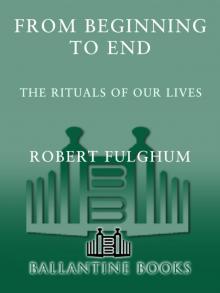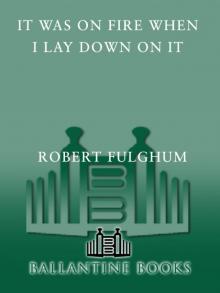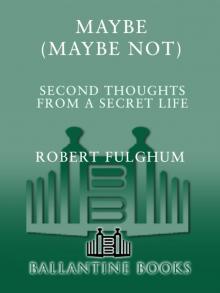- Home
- Robert Fulghum
Maybe (Maybe Not) Page 5
Maybe (Maybe Not) Read online
Page 5
The father feels ill, realizing that the great bowling ball of fate is headed down his alley.
“Please, Jack, please, please,” she whispers.
At that moment, everybody in the room knows who is going to buy the pooch. “DOG” is going home with Jack.
Having no fear now of being stuck themselves, several relieved men set the bidding on fire. “DOG” is going to set an auction record. The repeated hundreddollar rise in price is matched by the soft “Please, Jack” from the stage and Jack’s almost inaudible raise in the bidding, five dollars at a time.
There is a long pause at “Fifteen hundred dollars—going once, going twice …”
A sob from the stage.
And for $1,505 Jack has bought himself a dog. Add in the up-front costs, and he’s $1,765 into “DOG.”
The noble father is applauded as his wife rushes from the stage to throw her arms around his neck, while “DOG” wraps the leash around both their legs and down they go into the first row of chairs. A memorable night for the PTA.
I see Jack out being walked by the dog late at night. He’s the only one strong enough to control it, and he hates to have the neighbors see him being dragged along by this, the most expensive damned dog for a hundred miles.
“DOG” has become “Marilyn.” She is big enough to plow with now. “Marilyn” may be the world’s dumbest dog, having been to obedience school twice with no apparent effect.
Jack is still stunned. He can’t believe this has happened to him.
He had it down on paper. No. 7. Kids or pets, not both.
But the complicating clauses in the fine print of the marriage contract are always unreadable. And always open to revision by forces stronger than a man’s ego. The loveboat always leaks. And marriage is never a done deal.
I say he got off light. It could have been ponies or llamas or potbellied pigs. It would have been something. It always is.
Envy is part of the secret life.
In the public and private realms, envy has long been considered a sin infused with jealousy and a tendency to covet, which thou shalt not, especially in the case of thy neighbor’s wife and whatever. Still, in the sanctuary of our solitude, we envy.
There are degrees of envy. The “Lord-I-wish-I-could-do-that” envy that is carried on with a light heart and good humor is harmless enough. Most envy that doesn’t lead to theft and manslaughter is OK. Affirmative envy that reflects delight in the fringes of human achievement is a pleasure like bittersweet chocolate. You have to develop a taste for it.
In my case, I envy a guy who used to come into the old Buffalo Tavern in Seattle. He’d hang around the pool tables and offer to play you left-handed. Using a No. 5 trenching shovel for a cue. If you’d give him three balls ahead, he’d even play you with the digging end of the shovel, which had some duct tape on it to keep from nicking the cue ball. If you were smart and you weren’t one hell of a pool player, you’d leave well enough alone. And just offer to watch him destroy some other fool’s ego. But if you wanted to get a little education of the kind they don’t teach in high school, and you didn’t mind losing twenty dollars in a hurry, then you could take him on, shovel and all. I know about all this—firsthand.
Oh, he was good, all right, but he was nothing compared to his wife.
She played with a broom or a mop—your choice—no handicap.
She’d whipped every hotshot cue-pusher in town before she stopped playing pool and started having babies. Rumor is she played her obstetrician three rounds of eight ball for her bill, double or nothing. She won. My wife envied her.
My wife also envied Lena Horne, the tall, African-American, sexy, sultry torch singer who has graced the American stage for so long. My wife is short, Asian-American, sweet, and is good at old Girl Scout songs. It’s OK that she envied Lena Horne. For this kind of envy, you don’t go to hell.
At age fifty-five, I begin to realize there are some things I will never have or be or do. For lack of opportunity, equipment, inclination, talent, or something. Playing championship pool with a shovel or a broom or a mop is just not going to happen in my case. I’m stuck with the secret consolation of affirmative envy. My only hope is being reincarnated. I am counting big on reincarnation.
In my next life, I will be one of those who remembers great poetry and can recite it with skill and passion. I will be able to tie all kinds of knots and never forget how from one time to the next. When I come around again, I will have a brain that can become fluent in another language.
I will be able to play a small accordion, tap-dance, sing in a very deep bass voice, do close-up magic tricks, and play “As Time Goes By” on the slide trombone so well that all estranged lovers will be reunited when they hear it.
And I will finally be able to remember what beats what in a poker hand.
Note that I don’t ask to be handsome or wise. Those are burdens I couldn’t carry. Mostly, it’s just the small stuff I envy now and want next time. Like being able to shoot championship pool with a shovel.
Or maybe with a chopstick.
Now that would be something.
An article in The New York Times gave the price tag for a basic household tool kit. It suggested that the best buy was an all-in-one tool set, including a hammer, five pliers, nine screwdrivers, twelve combination wrenches, fourteen hex-key wrenches, an adjustable wrench, a forty-piece socket set, a seven-piece nut-driver set, a ten-foot measuring tape, a utility knife, a wire stripper, and a folding saw. In an aluminum case—$149.95 plus tax.
There was a time when I would have ordered two of these sets.
There was a time when I thought tools made the man. There was a time when I thought if I couldn’t actually own a hardware store, I’d at least like to live next door to one. That’s the handyman’s dream. On the other hand, if I had all the right tools and all the right parts, the obligation to always use the right tools and employ the correct parts might be inhibiting. It surely would take the creative edge off common home repair.
As a matter of fact, I already do have a great many of the right tools out in my garage somewhere, along with drawers full of proper parts. What I don’t have is the time to make ten trips out to the garage or sort through the boxes and drawers. I begin to realize that these tools and parts are talismans—juju devices to appease the household gods. Besides, it’s cold and dark out there in the garage.
But the real secret of efficient home repair is quite simple: Use what’s handy when the need arises.
I give you an example. At least half your basic home fixit jobs call for a screwdriver. You’d don’t really need to go out in the garage and spend ten minutes looking for that sixty-dollar twenty-piece matching set of screwdrivers with three styles of magnetic tips. Many screwdrivers are nearby. Fingernails. A dime, nickel, or quarter. But you really can’t beat the all-purpose combination of a butter knife and a nail file. In fact, the kitchen is full of knives that make great screwdrivers. So what if you snap the tip off one? No problem—you’ve got yourself an improved screwdriver.
Spoons also work quite nicely when the knives don’t. Even forks will pry the lids off cans, though forks should be reserved for mixing paint. The point is, you have at hand all the screwdrivers you’ll ever need. Right there in the kitchen.
Need a lightweight saw? That’s what serrated bread knives are for.
As to pliers: fingers. Or fingers with a dishtowel wrapped around the top of something that won’t come off after you’ve pounded the edge of it with the handle end of a butcher knife. Tweezers and clothespins work as pliers for small jobs. But the best pliers are in your own mouth—teeth, of course, teeth. Just don’t let your kids catch you.
And while I’m mentioning body parts, let’s talk about power tools—knees, elbows, fists, and feet. A great many things can be fixed by kicking, pounding, shaking, and throwing.
To cut and open things, there are, of course, all those knives in the kitchen, and the razor blades and manicure sets in the bathroom, which i
s a good place to use them because you are closer to the Band-Aids, which you will need sooner or later when you use sharp tools.
Sandpaper? Emery boards for fine work, a cheese grater for the heavy projects. Nutmeg grater for finesse.
Duct tape. Duct tape is a must. No home, office, marriage, or life should be without it. You can never have too much duct tape. Did you know it’s even required for all NASA missions in space? Seriously.
Just as basic are a pencil and a scratch pad—so you can leave a message for the repairman who comes when you have overrepaired something.
As for miscellaneous parts, don’t go to a hardware store. Go to a garage sale when some retired couple is selling out and moving to Florida. Buy that drawerful of stuff they have in their kitchen somewhere. The one full of thirty years’ worth of odds and ends. Most everything you’ll ever need for home repair is in there.
See, the truth is, at home, in private and in secret, we mostly make do. That’s how we run our lives most of the time. We might as well accept that. And feel good about it. And get good at it. It’s a matter of attitude, as summarized in these nine rules from the Fulghum Guide to Being Handy Around the House:
1. Try to work alone. An audience is rarely any help.
2. Despite what you may have been told by your mother, praying and cursing are both helpful in home repair—but only if you are working alone.
3. Work in the kitchen whenever you can—many fine tools are there, it’s warm and dry, and you are close to the refrigerator.
4. If it’s electronic, get a new one, or consult a twelve-year-old.
5. Stay simpleminded. Plug it in, get a new battery, replace the bulb or the fuse, see if the tank is empty, try turning the “on” switch, or just paint over it.
6. Always take credit for miracles. If you dropped the alarm clock while taking it apart and it suddenly starts working, you have healed it.
7. If something looks level, it is level.
8. If at first you don’t succeed, redefine success.
9. Above all, if what you’ve done is stupid, but it works, it ain’t stupid.
It’s August—a Wednesday morning—and I’m rolling down the road toward town and Moon’s Barbershop. As I drive, I wonder if I’ll ever be one of those old geezers who have nothing better to do than hang around the shop swapping tales. I hope so.
And when I glance up into the rearview mirror, I see I may be getting closer to geezerhood than I thought. I do have a few stories of my own. Maybe today I’ll just take a chair after I get my haircut and lay out an adventure I had the summer I was seventeen. Maybe I should rehearse this—work on my geezer style and tone of voice.
“Let me tell you about moths. People around here say you better watch out for black-widow spiders, but I say moths is worse—they’ll eat your clothes and cause fires. Them moths they’re a lot more dangerous than you think. That’s right, moths. You can get killed messing with moths. One damn near burned the bunkhouse down over at the Prade ranch one summer. I’ll tell you. Me and two or three other boys were mending fence for Old Man Mickel that year.
“At night Rusty he liked to crank up the lamp and read to himself to get sleepy. But all the bugs in Carson County would come for the light and Rusty he spent most of his time swatting and whipping at bugs instead of reading. Just made him crazy. So one night, hot as it was, Rusty he closed every door and window in the bunkhouse and he stuffed newspapers and socks in every single hole and crack he could find where bugs could get in. Spent an hour doing it and worked up quite a sweat but said he didn’t give a damn he’d sooner fry to death than go bug crazy.
“Anyhow, Rusty he put the lamp over by his bed and he got a Life magazine and rolled that sucker up for a club and he stood there by the bed and he beat hell out of the few stray bugs left in the room that was stupid enough to go for the lamp. It was a massacre. He beat the fur off them bugs, let me tell you. There was bug bodies in little pieces every which way. He killed every last one of them. He thought.
“It got quiet and old Rusty he rolled himself a smoke and got himself an old Reader’s Digest and settled down to bed to read in peace. He was just about asleep when this big gray fuzzy moth come from who-knows-where and went to circling the light and swooping down between Rusty and his Reader’s Digest and Rusty he went to grabbing at it and slapping at it but he couldn’t catch it or kill it. Well, I guess something just busted loose in his mind because the next thing I knew old Rusty he roared up out of the bed screaming and cussing and he run over into the next room and grabbed a piece of stovewood and come back hollering, I’LL TEACH YOU TO MESS WITH ME, YOU CORK SCREWIN’ SONOFABITCH!’ And he run right across his bed and took a swat or two and missed, and the moth he flew up high and lit near to the ceiling higher than Rusty could reach so Rusty he went to beating on the wall and screaming, ‘YOU’RE GONNA DIE, YOU’RE GONNA DIE,’ at the moth.
“Rusty beat the wall until the moth flew off and went for the light again. Old Rusty he swung and missed the moth and hit the coal-oil lamp dead center like he was stroking for center field. Broke the lamp all to hell and splattered burning coal oil and splintered glass all over the east end of the bunkhouse. Rusty couldn’t have done better with a stick of dynamite. Well, there was fire all over the wall and glass all over the floor and the rest of us come roaring up out of our beds, I’ll tell you, and started running for buckets and a hose and shovels and hollering like dogs in a fight. We got the fire out, but not before it scorched up the bunkhouse pretty good. We was washing smoke out of our sheets and picking glass out of our feet for a week.
“Couple a days later Rusty was trying to read again and there’s this big old gray moth come flittering onto his pillow. Rusty hollers, ‘IT’S HIM, IT’S HIM, HE’S COME BACK FROM THE GRAVE!’ But I don’t know—even a moth ain’t that stupid. Rusty hollers he’s going to get his shotgun and blow this sucker clean to Jesus. I blew the lamp out about then. I didn’t want to die before payday.”
By the time I got to Moon’s, I was fired up. I did it—got my haircut and then went out front where the geezers were sitting in old cane-bottom chairs on the sidewalk in the shade. I told my story. They laughed politely enough, in an indulgent sort of way. But it was the last story I got to tell. I had reminded them of even better tales, and they were off and running.
The truth was clear—I was an amateur among professionals. There’s more to a performance than just the contents of the story. I’ll have to learn how to hold my mouth just right, learn not to laugh at my own yarn, and develop a slumped, nonchalant lean while sitting in a chair. Guess I’ll have to learn to spit, too. Real geezerhood may still be a way off for me.
Over the last couple of months, I have received information from the following organizations:
The National Tattoo Association
The International Save the Pun Foundation
Clowns of America International
Burlington Liars’ Club
Thimble Collectors International
National Association to Advance Fat Acceptance
Fairy Investigation Society
The Anti-Circumcision League
The International Federation of Tiddlywinks Associations
American Poultry Historical Society
Spark Plug Collectors of America
Count Dracula Fan Club
Bobs International
Snowdome Collectors’ Association
Liberace Fan Club
National Pygmy Goat Association
The Howdy Doody Memorabilia Collectors Club
The American Fancy Rat and Mouse Association
The Flying Funeral Directors of America
Bat Conservation International
American Council of Spotted Asses, Inc.
American Roller Coaster Enthusiasts
Procrastinators’ Club of America
The Society for the Investigation of the Unexplained
Membership in the last organization appealed to me, because I had not so
licited this remarkable pile of mail and had a hard time explaining to my secretary and wife how this barrage came about. I could qualify for the Society for the Investigation of the Unexplained.
At first, I found the brochures amusing, then amazing, then fascinating.
Most are serious organizations, and their existence could be taken seriously.
The right to freely associate and assemble is what our country is about.
Here’s proof at least that some of us are taking advantage of the privilege.
There must be thousands and thousands of organized groups—finding kinship around almost every human interest or point of view. These organizations illustrate our need for company—to know we are not entirely one of a kind, despite a paradoxical need to be unique.
I received material from one man who was the only member of his group. But he found there were others who also belonged to one-person groups, so he now heads up the International Association of Single-Minded Rogue Males and One Person Clubs.
As the unsolicited mail continued to pour in, I realized this had to be the work of a practical joker. One of my friends had set me up. I had three in mind. The three friends with the most complex senses of mischief, who always operate on the other side of the conventional. Not wanting to tip my hand, I carefully stalked the suspects for weeks.
When I was sure I knew which of my friends submitted my name to all these groups, I sent in his name and the membership fees and joined him up to all of them.
The tables are turned on him.
But no. The joke is on me.
I guessed the wrong friend.
And the guy I did join to all these groups is as blown away by his membership mail as I was. Congratulations to him! There are now two members of the Where-the-Hell-Did-This-Come-From? Mystery Mail Association. Welcome to our club!

 All I Really Need to Know I Learned in Kindergarten
All I Really Need to Know I Learned in Kindergarten What On Earth Have I Done?
What On Earth Have I Done? From Beginning to End
From Beginning to End It Was On Fire When I Lay Down On It
It Was On Fire When I Lay Down On It Maybe (Maybe Not)
Maybe (Maybe Not)